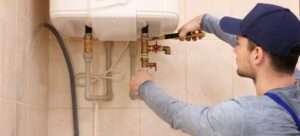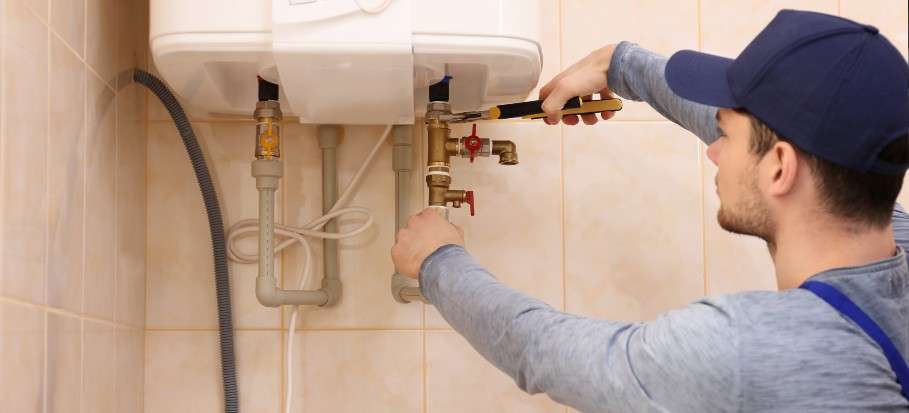Why is My Combi Boiler dripping water?
Leaking of combi boilers cannot be ignored if left further developing, but they also cause a lot of damage and become a severe health hazard. When visible and handled quickly by a safe gas engineer that meets the requirements will save a lot of money and stress.
Several leaks can develop in combi boilers, ranging from poor installations to decreased age or too much pressure in the system. The most crucial reason for leakage is to fix it as soon as possible. We have collected guidelines on identifying leaks and what you can do next.

How do I know if my combi boiler is Leaking?
If your boiler continues to cut because of low pressure, this could be because you have a leak that has not been noticed. Sometimes you might see leaky boiler water on the surface or wall below. More minor leaks can also express themselves as stains or molds close to the boiler or curved sliding boards.
The dripping combi boiler from the bottom of the unit can be caused by the wrong heat exchanger or internal leakage that has not been identified. If you see water out of the boiler, you need to contact an experienced company that can quickly attend to your property to solve this problem.
Repairing a leak will also save your money in the long run because it ensures you save water – ignoring it will mean your water bill tends to be higher.
Why does my water leak into my boiler?
When the combi boiler operates correctly, you should not see the water leak from the system. If you do it, it can be due to:
- Water pressure is too high or low in the system.
- Heat Exchange – which converts cold water into hot water – has been damaged.
- The connection that connects the pipe to the boiler may not be sealed correctly after installation.
- You may have an old system that requires boiler service and repairs in some parts.
- Often leaks can be improved without the need for new boilers, although this depends on the type and level of leakage that occurs.
Type of leakage: Where did the leak come from?
· Water leaked from below.
Customers often ask: “My combi boiler leaked water from below; what can I do?” It can be caused by leaks from a heating pump, damaged pressure releasing valves, corrosion of heating exchanges, or problems with automatic air ventilation.
· The condensate pipe drips
A cracked heat exchanger can cause a condensate boiler pipe to drip. It can cause the parent water or drying system into the condensate pipe, and hot water can cause the pipe connection to fail. Installing a new heat exchanger must finish it.
· Water drips from the Overflow Boiler combi’s pipe.
Overflow boiler pipes drip from the Kombi system (pressure release valve) usually because there is too much pressure in the system or the valve is not sealed correctly. A safe gas engineer can diagnose and repair the Kombi boiler in this way.
Common Causes of Leaking Combi Boiler
Leaky heat exchanger
It is common in the older budget or boiler model. However, this is not something you will be able to diagnose yourself, so you will need a professional engineer to come and identify this problem. The leaky heat exchanger can mean the end for a boiler, although there is an opportunity to replace it. In many cases, more cost-effective to buy a new boiler.
High water pressure
The boiler began to fight when they experienced too much pressure, which caused them to strike. Check the pressure gauge on the boiler – anything above sign one and the green blade will indicate a pressure problem.
The easiest way to improve high water pressure is to ingrain the radiator. Before starting, you must always ensure that the loop of filling in a beat under the boiler is closed. Then use the radiator button to bleed, and rotate until the water comes out to reduce the pressure on the boiler.
The tip here is to bleed the radiator at the highest point in your property – often the rail of bathroom towels – when the air rises through the system and often ends here.
Leaky boiler pipe
Pipe corrosion under the boiler is a common reason for boiler leaks. Sometimes it can also be caused by poor installation, although the first is a more public event. Check the pipe and if there is wet or leak. If so, then this is the source of the problem.
You must call an expert engineer to repair a leaky boiler pipe. But you can help accommodate water meanwhile by placing the bowl underneath to catch it, so it does not flow across the surface below.
Leakage from the internal boiler section
Some leaks can be more easily identified than others. Internal boiler leakage on the connection and parts such as seals can result from decay due to sustainable pressure on the system. When the seal is damaged, water can start enough.
You can delete the boiler cover to check if you feel comfortable doing it. Or, call the engineer who will be able to see this very quickly. Usually relatively easy to fix, and seals do not require much money to replace.
How to check the leak caused by a poor installation?
You will not need to know that the leak is caused by poor installation. Could be something that can only be improved by the safety gas engineer that meets the requirements. It may be necessary that new boiler installations be needed to fix existing problems. It may be more expensive than you expect, but it will ensure you and your family are safe.
Is this an emergency?
If a leak occurs in your boiler, you must contact an experienced gas safe gas engineer for example https://madsan.co.uk/. No matter how small it seems, leakage can ultimately cause severe damage that occurs also to your property.
https://madsan.co.uk/ leaks often have a reasonably straight improvement in the future, and many people will feel comfortable. However, improving efforts can worsen the situation if the diagnosis of what causes leakage is incorrect. If you doubt it, please get in touch with the company that installs your boiler system or experienced safety gas engineers like us.


